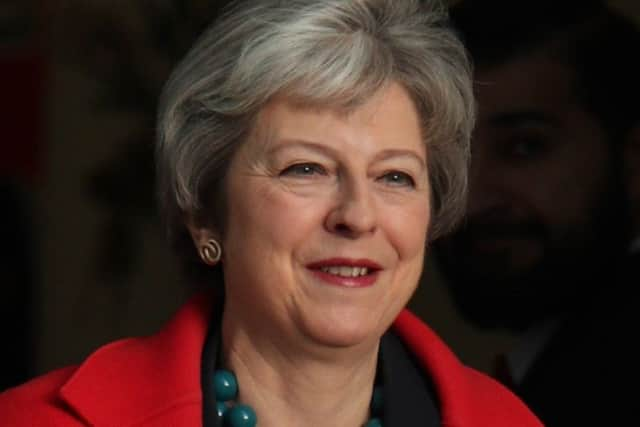Alex Kane: The only real certainty is that anything is possible
and live on Freeview channel 276
At this point there are no certainties. Theresa May could be gone by the middle of next week if she doesn’t get the Withdrawal Agreement through the Commons. Or, she could somehow get it through, but with the ‘backstop’ still in place and unionists angrier than they have ever been. Or, there could be an extension to the Article 50 negotiations. Or, another referendum. Or, another general election. Or, the formal splitting of the Conservatives. Or, Jeremy Corbyn as prime minister. Or, maybe Boris Johnson. The UK could still be in the EU. Or, the UK could be out, but without a deal and in trading waters which haven’t been charted by the country for decades. As I say, anything is possible.
What is clear – indeed, what has been clear since the general election in 2017 – is that there isn’t a majority in the House of Commons for a clean-break exit from the EU. Actually, the only party which is in favour of the clean-break deal is the DUP. And nor, I sense, is there a majority for an exit without a deal. But if Mrs May’s Withdrawal Agreement goes down the pan next week – and the arithmetic still seems heavily stacked against her – it will not be possible to construct a coalition around an alternative. So she will still be trying to persuade the EU to shift on the ‘backstop’; but that will only happen if there is a 100% guarantee that she can keep Rees-Mogg and co on board for the vote.
Advertisement
Hide AdAdvertisement
Hide AdShortly after the vote of confidence in Mrs May, Rees-Mogg hinted if there were legal clarity on the ‘backstop’ he might be prepared – even though he still had difficulties with it – to support the agreement. In his speech to the DUP conference in November Boris Johnson laid into the ‘backstop’, but also made it clear that there were many parts of the agreement he could live with. The DUP would, I think, be happy enough to back it if the ‘backstop’ was gone and Rees-Mogg’s ERG was on board. All to play for, then.


Shortly after the ‘backstop’ became public I suggested it would ‘be useful’ if the DUP and Irish government (along with representatives from the UK government, EU negotiators and SF, UUP, SDLP and Alliance) ‘sat down for a couple of days to see if they could find something they could all live with’. That approach still strikes me as sensible. Adding the Irish voice to the mix would also be more persuasive for the EU negotiators.
A bespoke deal – one which recognises very specific Irish interests and doesn’t create constitutional uncertainty for unionists (even those in the Remain camp) – has always been possible and the DUP should have focused on that rather than the uber-unionist dimension of their deal with the Conservatives: which, let’s face it, hasn’t worked out all that well so far. All of this requires grace, compromise and commonsense from London, Dublin, Belfast and Brussels. It’s still not too late.
Meanwhile, it’s going to be a busy few months in NI. My understanding is that the RHI Report will be published ‘reasonably quickly’ (it’s in nobody’s interests to have its shadow hanging over politics for too long): and it is not overegging the case to say that its findings, conclusions and recommendations could determine Arlene Foster’s position as DUP leader. The latest round of talks is also due to kick start in the next few days, but I don’t see any evidence that either the DUP or SF is in a mood for compromise. That’s not surprising, given that the local council elections are due in May and parties are always reluctant to give hostages to fortune just before voters head to the ballot box.
Advertisement
Hide AdAdvertisement
Hide AdI can’t see the DUP taking a huge hit – if only because none of their pro-Union rivals seem capable of landing a blow on them. But it is worth remembering that in the last elections, in 2014, the DUP was slightly behind SF in votes (even though they still ended up with more seats). Mind you, that was on a 51% turnout. Turnout will be considerably higher this time – at least 60%, I think – and the campaign could be brutal in terms of toxicity. That benefits both big parties. A ‘bad’ or ‘difficult’ Brexit deal will also have an impact.


It may also be the first election fought by an SDLP/Fianna Fáil coalition, so it will be interesting to see if the Colum Eastwood/Micheál Martin gamble pays off, or goes the way of the UUP/Conservative UCUNF deal. Success has to be measured by the electoral hit it inflicts upon SF. Nothing else matters. The entire project is predicated upon the joint interests of both parties being geared towards stopping and then reversing the electoral damage that SF has done to both of them.
Another general election remains in play. Again, the odds favour the DUP. They could lose South Belfast, but offset it with North Down. North Belfast could be a problem for Nigel Dodds, but he’d probably survive. An Assembly election can’t be dismissed, either. Unionists regaining their overall majority is not possible, so the DUP’s main concern will be staying ahead of SF (who were only one seat and 1,200 votes behind them in 2017). An SDLP/FF pact, particularly if it picks up a couple of seats from SF, could actually be quite good for the DUP. And a brutal DUP versuss a new pan-nationalist front (which is how the DUP will describe it) battle would probably see votes and seats shift from the UUP to he DUP.
For columnists and commentators all of this is manna: it’s always good to have something to write and talk about in my line of work. But, as I say, everything is in play and anything is possible. Anyway, happy new year everyone.